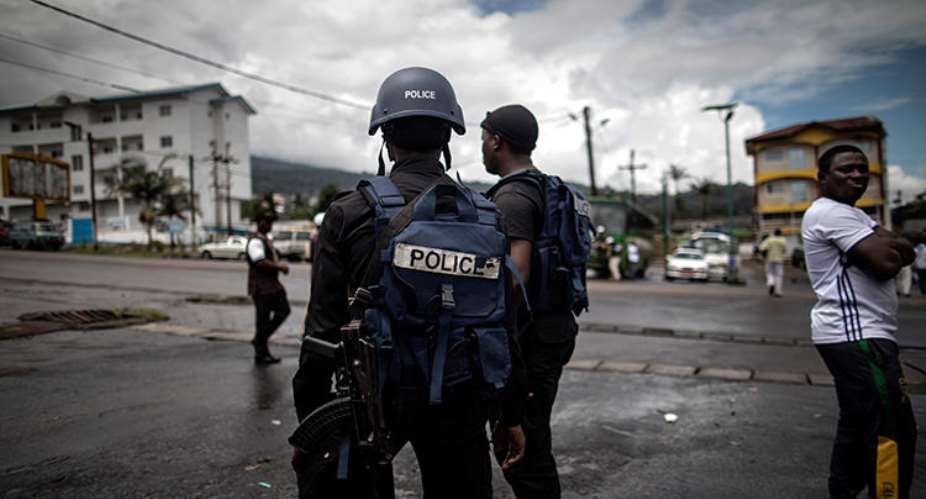Police officers are seen in Buea, Cameroon, on October 3, 2018. Cameroonian journalist Martinez Zogo has been jailed since January. (AFP/Marco Longari)
New York, February 18, 2020 -- Authorities in Cameroon should immediately release journalist Martinez Zogo, drop all charges against him, and reform the country’s penal code to decriminalize defamation, the Committee to Protect Journalists said today.
On January 17, judicial police officers in Yaoundé, the capital, arrested Zogo at the offices of Radio Amplitude FM, a privately owned broadcaster where he works as editor-in-chief, Zogo’s lawyer, Joseph Kenmoe, told CPJ in a phone interview.
Authorities charged him with criminal defamation following a complaint filed by Sylvie Biye Essono, the ex-wife of a government official, which alleged that Zogo had spread false information about her in a January 8 broadcast, Kenmoe said. On January 25, Zogo was transferred to Yaoundé’s Kondengui prison, where he remains in detention, Kenmoe told CPJ.
In Cameroon, defamation carries a maximum penalty of six months in prison and a fine of 2 million Central African francs ($3,447), according to the country’s penal code . Zogo is due in court on February 27, Kenmoe said.
“Martinez Zogo should be released immediately and the legal proceedings against him dropped,” said Angela Quintal, CPJ’s Africa program coordinator. “Cameroon’s maintenance of defamation as a criminal offense signals its disrespect for basic press freedom and unwillingness to align its laws with international standards on freedom of expression.”
In her complaint, filed on January 14, Essono alleged that Zogo insulted her and said she had used her ex-husband’s name when applying for government contracts, Kenmoe said. He said that her original complaint accused Zogo of cybercrime, blackmail, and defamation, but authorities only filed the defamation charges against him.
CPJ called Essono’s lawyer, Tchoungang Charles, for comment but he did not answer the phone. CPJ sent text messages to Charles that were marked as read, but which did not receive any response.
Joyce Ndjem, the national communications chief for the Cameroonian police, told CPJ in a phone interview that it was not possible to answer questions about Zogo’s case unless a CPJ representative came to see her in person, and then the line disconnected. CPJ’s follow-up calls went unanswered.
When CPJ called Cameroonian Minister of Information Rene Sadi for comment, he said the call quality was poor and then the line disconnected. He did not answer follow-up phone calls.
Cameroon is the second-worst jailer of journalists in sub-Saharan Africa, according to CPJ’s 2019 prison census, which found seven journalists in jail as of December 1, 2019.





 Burkina Faso expels French diplomats for 'subversive activities'
Burkina Faso expels French diplomats for 'subversive activities'
 GOIL reduces petrol price by 29 pesewas, sells GHC14.70 per litre
GOIL reduces petrol price by 29 pesewas, sells GHC14.70 per litre
 The disrespect towards security is terrible; we can do better — Atik Mohammed co...
The disrespect towards security is terrible; we can do better — Atik Mohammed co...
 Starlink to cease connection in Ghana, other “unavailable” countries on April 30...
Starlink to cease connection in Ghana, other “unavailable” countries on April 30...
 MMCEs, DCEs and Regional Ministers must be elected to reduce political interfere...
MMCEs, DCEs and Regional Ministers must be elected to reduce political interfere...
 National Cathedral: ‘Nonsense; you take taxes from broke Ghanaians to dig a clum...
National Cathedral: ‘Nonsense; you take taxes from broke Ghanaians to dig a clum...
 April 18: Cedi sells at GHS13.59 to $1, GHS13.01 on BoG interbank
April 18: Cedi sells at GHS13.59 to $1, GHS13.01 on BoG interbank
 We must harness the collective power and ingenuity of female leaders to propel o...
We must harness the collective power and ingenuity of female leaders to propel o...
 Saglemi Housing Project will not be left to rot – Kojo Oppong Nkrumah
Saglemi Housing Project will not be left to rot – Kojo Oppong Nkrumah
 Asantehene commends Matthew Opoku Prempeh for conceiving GENSER Kumasi Pipeline ...
Asantehene commends Matthew Opoku Prempeh for conceiving GENSER Kumasi Pipeline ...
